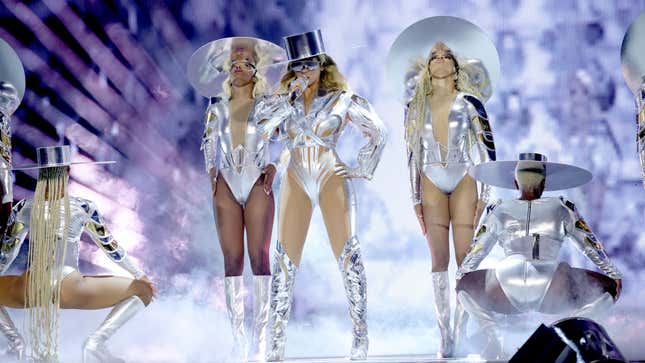
During Beyoncé’s performance of “Alien Superstar” in Glendale, Arizona, last August, the power went out. With 56 dates to choose from on her Renaissance tour, it would be easy enough to leave this instance in the past, to not include it in your highlight reel-cum-concert film. But in Beyoncé’s world, a meticulously executed performance isn’t the only thing she wants to spotlight; she wants to show you the 10 minutes of chaos behind the scenes as the crew hurried to restore power. She wants to show you her decision to change her costume, just because she had an unexpected break. Beyoncé wants to show you the work, the grit, the ingenuity. She wants to show you, as she repeats, her renaissance.
And so Renaissance: A Film By Beyoncé is as much a documentary of Beyoncé’s creative and rehearsal process as it is a concert film. About 50 percent of the 168-minute film reveals our current queen of music walking us through her stage and lighting design, the importance of Uncle Johnny, her knee surgery and recovery, her rental house in Cannes. For the devout, Renaissance feels similar in tone to a previous Film By Beyoncé, Homecoming, which documented the process of creating her landmark 2018 Coachella set. But Renaissance improves upon that form, more or less successfully recreating the feeling of actually being in the stadium with 60,000 other fans.
Part of the reason Renaissance is so successful is certainly due to the sheer quantity of footage: 56 three-hour concerts were blended for the musical segments, while a documentary crew followed Bey, her team, and her family over what she tells us was a four-year process to bring the show to the stage. The concert footage is absolutely stunning, equaling and even surpassing the cinematography of her visual albums. (The awestruck fan reactions from the audience help, humorously, drive that feeling home.) And while there are some notable songs missing (“Love On Top,” cough cough), Bey does manage to hit the entire Renaissance album track list in one way or another, even songs like “All Up In Your Mind” and “Thique,” which didn’t make it into the setlist of every tour stop.
When it’s a documentary, Renaissance is focused on both Beyoncé the professional and Beyoncé the mother. It’s a given that we’re only seeing what she wants to show us; this is a woman who has hardly given a proper interview in a decade. In some respect, Renaissance is her doing that, posing herself the questions that she wants to answer, answering them the way she wants to answer them. But she’s adept at addressing the things she knows you want to know.
Take, for example, the episode where Beyoncé explains how Blue Ivy came to dance on the stage with her during “My Power”/“Black Parade.” Blue wanted to perform during one show and Beyoncé, reasonably, felt that a stadium tour was an inappropriate performance venue for an 11-year-old. When Bey was 11, she was spending her summers in performance boot camp, performing in parking lots and over airline PA systems. Blue hadn’t experienced that struggle; it’s easy to assume Blue hasn’t faced much struggle as the daughter of two incredibly famous, wealthy people. But the problems she has faced are unique to her station; Blue was dealt racist critiques of her appearance as a literal baby. So when her first performance during the tour was criticized by some online, Beyoncé shares that it inspired Blue to work harder to perfect the dance moves, calling it a renaissance for her eldest daughter and a moment where she learned to take control of her narrative.
Of course, this scene is perfectly calibrated to tug on the heartstrings, but any cynicism melts away when both mother and daughter are absolutely beaming with pride on the stage next to each other. (There’s also a charming call-back to this later, when Jay-Z tells Blue about how proud Bey is.) Pride and lineage recur throughout Renaissance, particularly in the parallel between Megan Thee Stallion joining Beyoncé on stage, screaming “I love you Beyoncé!” at any free moment, and Beyoncé running onstage to meet her idol Diana Ross. These moments with Blue and Ross go a long way to humanize Beyoncé in a set that makes her look superhuman. For a moment, she is the one doing the adoration.
One key to Beyoncé’s stardom has always been that her performances are polished and nigh-perfect, but they don’t look effortless. She wants you to know how hard she works to put on her show, and Renaissance is a document of that. In that way, the film is perhaps the most Beyoncé a project has ever been. It’s Beyoncé self-mythologizing in a way that’s awe-inspiring (or slightly eye-roll-inducing, depending on your mileage) but then proving it with her performance. 26 years into her career, Beyoncé is still finding ways to improve and perfect her craft. There is simply no one else alive who can do what she can do: to hold a crowd like that, to move like that, to sing like that hours into her stage time. If Renaissance is any indication, she still has further to go.